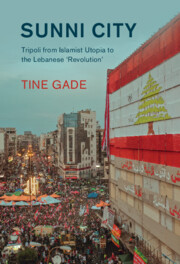Book contents
- Sunni City
- Cambridge Middle East Studies
- Sunni City
- Copyright page
- Contents
- Figures
- Acknowledgements
- Who Is Who in Tripoli?
- Timeline of Major Events
- Note on Arabic Transliteration
- Introduction
- 1 Tripoli’s City Corporatism and Identity Politics during the Nationalist Era (1920–1979)
- 2 Regional Proxy War
- 3 The Postwar Erosion of Tripoli’s City Corporatism
- 4 The Globalization of Islam and the Crisis of Religious Authority
- 5 The Future Movement
- 6 Tripoli’s Islamists
- 7 The Impact of the Syrian Civil War and Beyond (2011–2020)
- Conclusion
- Bibliography
- Index
- Books in the Series
5 - The Future Movement
Lebanon’s Political Crisis and Sectarianization (2005–2011)
Published online by Cambridge University Press: 10 November 2022
- Sunni City
- Cambridge Middle East Studies
- Sunni City
- Copyright page
- Contents
- Figures
- Acknowledgements
- Who Is Who in Tripoli?
- Timeline of Major Events
- Note on Arabic Transliteration
- Introduction
- 1 Tripoli’s City Corporatism and Identity Politics during the Nationalist Era (1920–1979)
- 2 Regional Proxy War
- 3 The Postwar Erosion of Tripoli’s City Corporatism
- 4 The Globalization of Islam and the Crisis of Religious Authority
- 5 The Future Movement
- 6 Tripoli’s Islamists
- 7 The Impact of the Syrian Civil War and Beyond (2011–2020)
- Conclusion
- Bibliography
- Index
- Books in the Series
Summary
The 2005 assassination of former Prime Minister Rafiq Hariri unleashed a political earthquake in Lebanon. Tripoli and its surroundings became a Sunni base for the Future Movement, led by Rafiq Hariri’s son Saad and other neoliberal elites from Lebanon’s nouveaux riches political class. For the first time, Tripolitanians rallied around a political party based outside their own city.
Many Tripolitanians supported the Future Movement in 2005 because they hoped that Saad Hariri, with his personal wealth and connections to Saudi Arabia, might bring investments to marginalized areas in northern Lebanon. However, these expectations were not met.
The Future Movement was an elite-based party, and its strategies of outreach to the poor had severe shortcomings. It used divisive sectarian (anti-Shiʿi) electoral strategies in Tripoli and empowered Sunni radicals, leading to a spiral of violence. Sunni hardliners gained prominent roles in Tripoli after Hizbullah and its allies turned their weapons inwards in Beirut in May 2008. However, this sectarian resource was insufficient to help the Future Movement maintain its popularity in Tripoli in the long run.
Keywords
- Type
- Chapter
- Information
- Sunni CityTripoli from Islamist Utopia to the Lebanese ‘Revolution', pp. 140 - 174Publisher: Cambridge University PressPrint publication year: 2022

